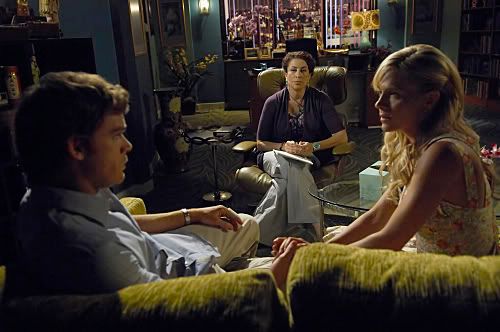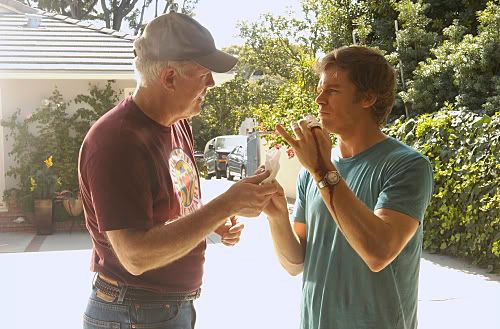I miss Doakes. At the end of the fourth season, it becomes all too clear that Doakes was the only smart person in a show full of ostensible detectives and police. As a result of his intelligence and intuition, Doakes placed an enormous pressure on the shoulders of Dexter (Michael C. Hall). Every scene between the two played like psychological cat-and-mouse, with Doakes’s curt dismissals (“You give me the fuckin’ creeps”) cutting through Dexter’s cool exterior and interior self-justifications. Erik King played the role to perfection, and his imposing, muscular stature made him doubly frightening.
It took a season and a half for me to value him, and that’s my own fault, but here I am, at the end of Season Four, a season that many called the show’s best since Season One, and I miss Doakes. A few elements temper that absence. John Lithgow gives a nasty, memorable performance as the Trinity Killer, a sociopath endlessly re-enacting his own family traumas, and a couple of surprising deaths establish some genuine stakes; after the status quo resolutions of Season Three, here are real consequences to Dexter’s nature.
As for the lead character, Michael C. Hall still plays him with the right mixture of stoicism and rage. The chief pleasure of Dexter, throughout the series, is watching Dexter struggle to keep his idea of himself, as an emotionless killer, above his true nature as an emotional family man. A romantic, even. This binary, as always, is visualized well through setting, with the colorful suburban homes, pleasing in their banality, at odds with Dexter’s night-life, always awash in deep blacks and reds, always urban and lonely. Curious how Trinity works in home construction, stuck in between the two worlds. He's trying, but the artifice is all too clear.
However, this season points too much toward Dexter’s growing emotionalism, as Dexter willfully admits to loving his family and takes on the Trinity Killer with a kind of symbolic, vengeful fury. With no one around to point out how awful he is, no one to fight his growing self-righteousness, Dexter’s out of balance. The man who once scoffed at society has lept, not stepped, into the role of husband and father, and he feels too close to Season Two's fictional (and off-base) Dark Defender.
Were there more opposition from surrounding characters, Hall’s Dexter might be pushed back into his intriguing duality. There are even a couple hints of this. Keith Carradine’s Frank Lundy returns to the show, out of the FBI, free to pursue his decades-long project of building the Trinity Killer case. Unfortunately, his sideways glances never amount to much, nor do the suspicious gazes of Desmond Harrington’s Quinn. He’s smart enough to study Dexter, but stupid enough to squander time in a tryst with an sexy, ambitious reporter; her ploy is so obvious that Quinn should be kicked off the force for sheer idiocy.
Then again, everyone in the department thinks with their gonads. Hornball Masuka is a joke that wore out its welcome seasons ago, and the big drama between Batista and LaGuerta is that they’re having illicit office sex; with the Spanglish and we-cannot-be-together silliness, their dynamic plays like a cheap telenovela. Even Debra (Jennifer Carpenter), supposedly a capable, intelligent woman, spends the first half of the season angsting over her new boyfriend and an old flame. No wonder Dexter never worries anymore. He’s been surrounded by a soap opera set in a police station for nearly five years. If only Doakes were here to cut through all the bullshit. There’s nothing like a deep-bass “Fuck you Morgan” to keep things interesting.
RATING: B-
 |
| I miss ya, big guy. |



I miss Doakes, too. I keep hoping that for the last few years, Doakes faked his death and has been gathering strength to plan his attack on Dexter (like Michael Myers in Halloween 4).
ReplyDeleteBut alas, I doubt that'll ever happen.